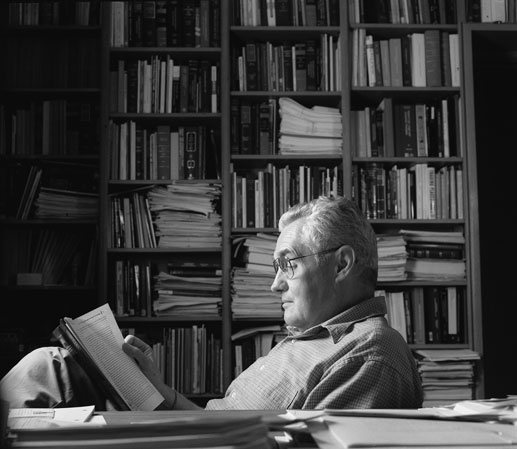International Law and the Future of Freedom: A Posthumous Publication of John Barton’s Work

The Bender Reading Room in Green Library is a beautiful place, peacefully looking over the Quad from the library’s top floor. On Wednesday afternoon April 30, it was home to a combined beginning and ending: Stanford University Press’s launch of the late John Barton’s posthumous book, International Law and the Future of Freedom.
John, JD ’68, George E. Osborne Professor of Law, Emeritus, died tragically in August 2009 after a bicycle accident. As his family sorted through his offices, they found that his last major writing project was very nearly done. They took the manuscript to the law school, where then-dean Larry Kramer helped arrange its publication by Stanford University Press. Helen M. Stacy, senior fellow of the Center on Democracy, Development, and the Rule of Law, Freeman Spogli Institute for International Studies, and an expert in international human rights, did the heavy lifting in converting the “almost done” manuscript into a finished book, with a (very) little help from me. And then we both had the honor of co-writing an introduction to the book—and to the man.
The book is a fitting capstone to John’s career. He spent much of his scholarly life outside the mainstream of the American law school, whether pioneering with colleagues the innovative course Law in Radically Different Cultures or working with international governments and groups on specific problems, from arms control to improving important crops to assessing the effects of intellectual property law on the developing world. John engaged with the worlds of law, quasi-law, and policy far outside state and federal courtrooms, but almost always on tangible, concrete problems.
International Law and the Future of Freedom is not the result of such a project. It is big theory, among the biggest, on how international actors—both governments and a host of non-governmental ones—should act together to create a fair and functional international system. If it is dealing with a concrete problem, it is doing so on a very ambitious level indeed and pulling political theory, history, and philosophy into its service. The book is not one of John’s projects; it is, in a real sense, a summation of the wisdom he gained through all of his many international endeavors.
I miss John greatly, but I am very happy that—thanks to the efforts of his family, Helen Stacy, the law school, and the Stanford University Press—he has been able to give us one last gift. I only hope we can learn something useful from it, which I am sure was John’s greatest hope, too.
4 Responses to “International Law and the Future of Freedom: A Posthumous Publication of John Barton’s Work”
Comments are closed.
Post Pagination

David Johnson
In 1991, it was John who convinced me to come to SLS, with him as my dissertation advisor. I vividly recall him saying that part of the job for every member of a faculty, here and elsewhere, was to “lift our students on our shoulders, to the very best of our ability.” He said this in conjunction with one of the topics of the moment, the intergenerational handoff. And so it is, with every day that I teach (such as today) and every term I undertake, that John’s words inspire, perhaps more accurately require, me to do the same, and to do it to the “very best of my ability,” even if that falls short of the aspirationally-high bar that John set across his teaching and academic career. I miss you John; there was much more I needed to learn from you. I’m hoping against hope that I will find it in this book. My thanks to Helen, I consider your work a gift that many of us will cherish.
David Johnson
David Reibel
When I came to SLS in 1988, there were not many law professors anywhere in the country who had such broad and deep expertise in both international law and technology law. John was an inspiration then, and his legacy continues in my career working with international software and telecom companies. John never shrunk from taking on the big issues, and this “last gift” takes on one of the biggest. I look forward to reading it.
David Reibel ’91
Gary Gechlik
John was simply a great person. I enjoyed his classes and he had great intuitions. I think he really led by example for a generation of Stanford Law students.
Gary Gechlik ’03
Mark Wilson
In 1973, John was a relatively new professor and he taught my first year Contracts class. He always exhibited great care for his students and conveyed the logic and beauty of Contract Law clearly. I was sorry to hear of his untimely death and I am sure, I am not alone among my fellow classmateds, to be happy that his book will be an important legacy for all of us. Mark Wilson ’76